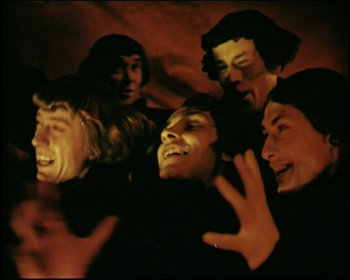After Eisenstein
dal 4/9/2008 al 1/11/2008
Segnalato da
4/9/2008
After Eisenstein
Lunds Konsthall, Lund
Olga Chernysheva, Boris Mikhailov

It is no coincidence that Lunds konsthall begins the 2008 autumn season with a concentrated presentation of art and cinema from Sweden’s mighty eastern neighbour. Hardly anyone can have missed the return of Russia as a self-confident great power this summer.
The Soviet Union disappeared from the world map in 1991, relatively undramatically and without much bloodshed. In our parts the new freedom in Eastern Europe and the resurrection of the three Baltic States were greeted euphorically, but many people in Russia and other post-Soviet countries regarded the collapse as a humiliating disaster. For them the last 15 years have been a period of protracted political and economic chaos. Now, when living standards are finally rising, they show little understanding for the world’s anxieties about the new authoritarian rulers in Russia and their intentions.
After Eisenstein starts from the legacy of the legendary Soviet filmmaker and offers still and moving images that help us understand what ‘Russian culture’ is today. Instead of attempting to give an overview of post-Soviet visual art, Lunds konsthall collaborates with the Kino cinema theatre to present four extraordinary authors who are not easy to classify or range into genres. Art as social commentary is an established tradition in Russia, but it yields the best results when followed subjectively and uncompromisingly. That is precisely what all participants in After Eisenstein do.
Sergei Eisenstein (born 1898 in Riga, died 1948 in Moscow) is a canonical figure of Soviet culture. Not just a pioneering film director but also an accomplished theoretician, essayist and draughtsman, he can no longer be labelled contemporary. Yet his persuasive cinematic imagery and his ideas about ‘attraction’, ‘montage’, ‘internal monologue’, ‘intellectual cinema’ and ‘emotional thinking’ still inspire filmmakers and other artists throughout the world. Eisenstein’s œuvre, however, also illustrates the ‘engaged’ artist’s complicated relationship with political power.
Two of the participants are key figures in post-Soviet culture. They represent the Ukraine rather than Russia. Boris Mikhailov (born 1938), one of today’s foremost art photographers, comes from the Russian-speaking city of Kharkov in northern Ukraine. Since a few years he also lives in Berlin. Among his best-known series, occasionally shocking to outside observers, are visual accounts of life in his home city during the ‘transitional’ period after 1991. Kira Muratova (born 1934) is originally from Moldova, but has worked in Odessa on the Ukrainian Black Sea coast for almost half a century. She is considered one of the finest filmmakers of the Russian-speaking world.
Olga Chernysheva (born 1962) lives in Moscow and works both at home and internationally. Her art centers on Russian culture and the ongoing fragmentation of its master narratives into puzzling, disconnected absurdities. In photographs and films, but also in drawings and paintings, she observes with both empathy and detached curiosity how people around her are managing post-Soviet and New Russian life.
After Eisenstein is supported by the Culture Programme of the European Union as part of the exchange project Opening Hours, initiated by U-TURN, the Quadrennial for Contemporary Art in Copenhagen. The other collaboration partners are the Berlin Biennial, the Mücsarnok kunsthalle in Budapest and the art journal IDEA in Cluj (Romania).
Opening: Lunds konsthall, Friday, 5 September 6–8 pm
Kino Cinema Theatre:
Sergei Eisenstein, Kira Muratova
Lund Konsthall
Martenstorget - Lund



